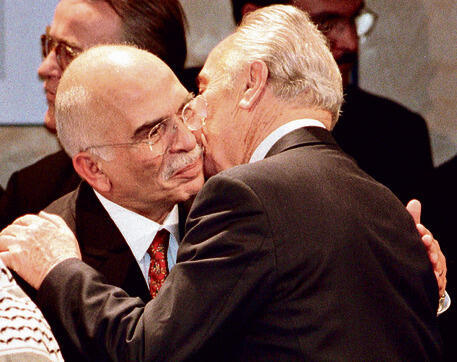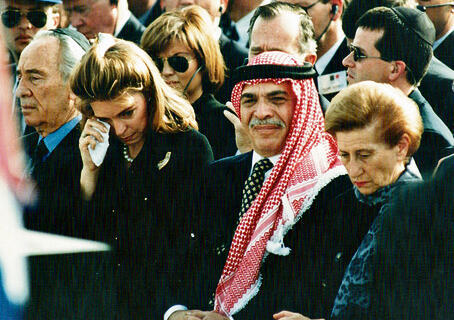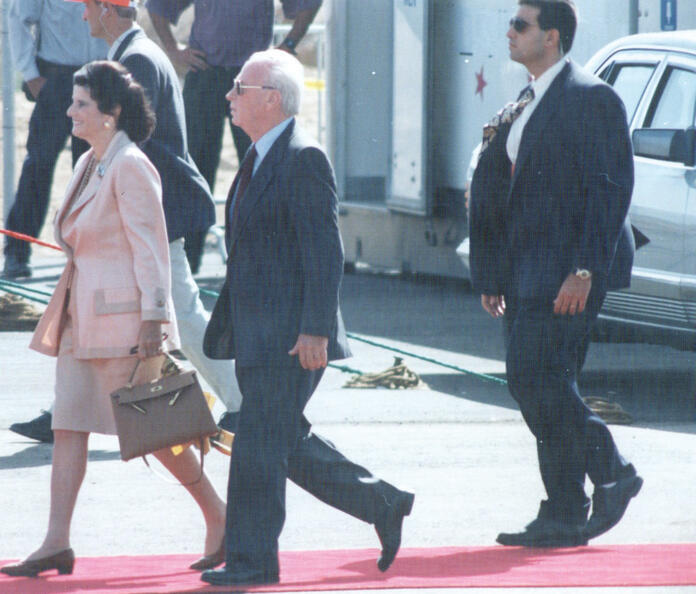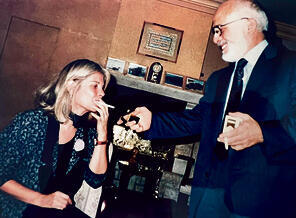Getting your Trinity Audio player ready...
Three Jordanian civilians dressed in military uniforms infiltrated Israel near the Dead Sea with the plan to carry out an attack using Glock pistols on an Israeli military post. The plot was foiled just in time. Two of the assailants were shot and killed, while the third escaped back to Jordan. An Israeli soldier and a reservist were injured during the pursuit.
The Jordanian military quickly issued a statement denying the attackers were Jordanian soldiers. Shortly after, a spokesperson for the Jordanian Muslim Brotherhood, whose members recently secured 31 seats in parliament, identified two of the attackers and revealed the wills they had left behind, citing "revenge for Gaza." "They are members of our group," confirmed the spokesperson, Muath al-Hawalda.
5 View gallery


Prime Minister Yitzhak Rabin, US President Bill Clinton and Jordan's King Hussein
(Photo: Yaakov Sa'ar)
Tensions between Jordan and Israel have escalated in the past year. Last month, a Jordanian truck driver shot and killed three Israelis at the Allenby Bridge, in the area where Jordanian trucks are inspected before heading to Gaza.
Additionally, Jordanian MP Imad al-Adwan was caught smuggling weapons and gold intended for a West Bank terror group. Although it wasn’t his first attempt, this time he was caught in the act, arrested, interrogated and later returned to Amman under Jordanian pressure. He faced a military trial and was expelled from parliament.
Astonishingly, this Saturday marks 30 years since the signing of the Israel-Jordan peace agreement. Few remember King Hussein’s first interview with Ynet's sister publication Yedioth Ahronoth, where he declared, “This will be a unique peace.” The iconic image of King Hussein lighting a cigarette for the late Prime Minister Yitzhak Rabin soon after, and affirming that "Jordan is Israel’s mirror state," remains a poignant symbol of those early days of peace.
All the kind words and glittering promises didn’t hold. Yitzhak Rabin was assassinated, King Hussein died of cancer and the landscape changed. Hussein's son and heir, King Abdullah told a British newspaper that "the hardest times of my reign are because of Netanyahu."
Relations grew colder, one negative event after another, while Israel’s embassy in the Rabia district of Amman became the focal point of protests by hundreds, sometimes thousands, of angry Jordanians.
I clearly remember the day an Israeli security guard shot and killed two Jordanians in his apartment. Without investigating the incident, Netanyahu summoned the ambassador and the guard to his office for a public embrace before the cameras, sparking outrage in Jordan.
The peace agreement with Jordan was meant to transform decades-old secret relations into a formal bond, akin to big sister-little sister relations. But since the Gaza war and the opening of the Hezbollah front, Iran has been focusing its efforts on Jordan, aiming to close off another front against Israel.
It’s important to note, however, that Jordan is not folding. Jordanian Foreign Minister Ayman Safadi, known for his harsh anti-Israel rhetoric, traveled to Tehran following Iran’s missile attack in April to warn them: "Don’t try to attack Israel from Jordanian soil." This marked a full circle after King Abdullah warned over 20 years ago about the threat of the "Shia Crescent" dominating the region.
King Abdullah has remained silent for a year now, with Queen Rania, the daughter of Palestinian parents, stepping in with sharp statements against Israel. To understand Jordan’s situation—divided between Bedouins and Palestinians, hosting hundreds of thousands of refugees, facing a dire economic situation and dealing with strained relations with Saudi Arabia—one must grasp the depth of the crisis.
Israel must now weigh its options: continue to engage with a cold Jordanian monarchy, or allow Palestinians to take control of the East Bank and become Israel’s new neighbors along the long border.
I return once again to the late Yitzhak Rabin and King Hussein, may Allah have mercy on him, to highlight their close and special relationship. Rabin would often, in secrecy, reminisce fondly about his ties with the king.
His senior advisor, the late Eitan Haber, built a strong bond with the head of the Royal Court, General Ali Shukri. It was hard not to be moved by the sight of Israelis patting the backs of senior Jordanian officials at the royal palace, or seeing Crown Prince Abdullah wandering the corridors of the Defense Ministry headquarters in Tel Aviv. I once "accidentally" ran into him, and we warmly shook hands.
Both former prime ministers Ehud Barak and Naftali Bennett also understood the unique importance of peace with Jordan, the 308-kilometer (191-mile) border separating the two countries, and the particularly close relations between the soldiers on both sides. Goods trucks flowed from Israel to Jordan, and from Jordan to the Gulf states. A parallel trade route was established between Jordan and the West Bank.
King Abdullah, like his father, dreamed of closer ties. But when Netanyahu came into office, the momentum stalled. While there were occasional high-level meetings, the king did not hide his bitterness.
Netanyahu, on the other hand, hinted at plans to transfer Jordan’s custodianship of the Al-Aqsa Mosque in East Jerusalem to Saudi Arabia—the very site where King Abdullah I, King Hussein’s grandfather, was assassinated.
Today, relations between the two countries are no longer out in the open. Military cooperation still exists, but it has been downgraded.
A similar incident occurred when Crown Prince Hussein’s visit to Israel was abruptly canceled, leaving him and his security team furious. The same happened to Jordan's ambassador to Israel, Ghassan Majali, who was blocked from entering, only to return days later after senior Israeli officials realized the sensitivity of the situation.
Today, relations between the two countries are no longer out in the open. Military cooperation still exists, but it has been downgraded. Two events are set to take place in the coming days to mark 30 years of the important peace treaty. At the first event, hosted by the Institute for National Security Studies, it has been made clear that there would be no Jordanian presence, per a direct order from Amman. For the second, on the anniversary of Rabin’s assassination, there is still consideration of bringing a small group to reflect on what the peace once was.
A recent attempt I made to visit the kingdom was met with a cold response. "Don’t come," a very senior Jordanian official warned me. "And if you insist on coming, don’t call me, because you’ll get us both into trouble."
Get the Ynetnews app on your smartphone:





